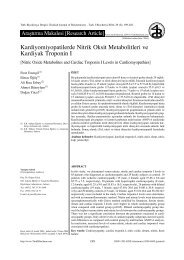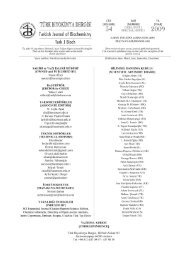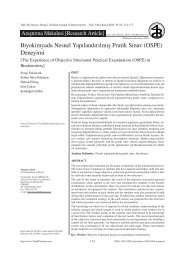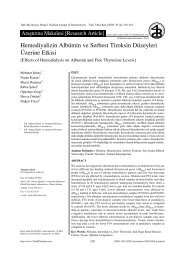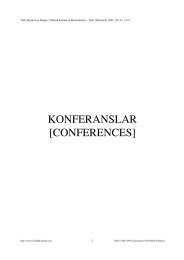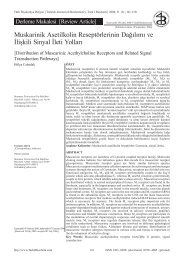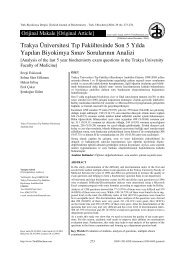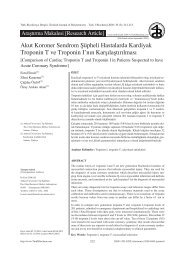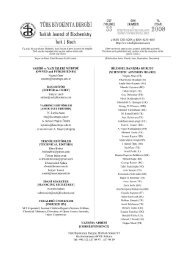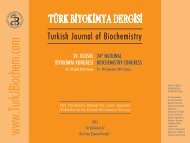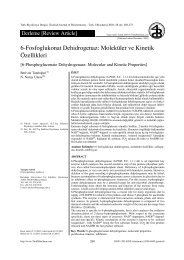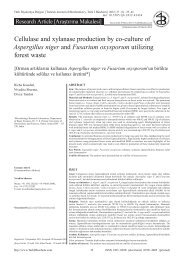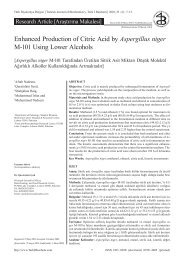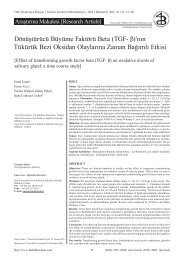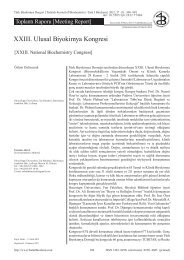23. Ulusal Biyokimya Kongresi Ãzel Sayısı - Türk Biyokimya Dergisi
23. Ulusal Biyokimya Kongresi Ãzel Sayısı - Türk Biyokimya Dergisi
23. Ulusal Biyokimya Kongresi Ãzel Sayısı - Türk Biyokimya Dergisi
You also want an ePaper? Increase the reach of your titles
YUMPU automatically turns print PDFs into web optimized ePapers that Google loves.
XXIII. ULUSAL B‹YOK‹MYA KONGRES‹<br />
29 Kasım - 2 Aralık 2011<br />
Hilton Hotel - Adana<br />
<strong>23.</strong> <strong>Ulusal</strong> <strong>Biyokimya</strong> <strong>Kongresi</strong>, Adana [23 rd National Biochemistry Congress, Adana / TURKEY]<br />
İÇİNDEKİLER<br />
P. 072 / KIZLCIK, NAR, HARUP VE FESLEĞEN’NİN<br />
HİPOKOLESTEROLEMİK VE HİPOÜRİSEMİK ETKİLERİNİN İNSAN<br />
KANINDA İN-VİTRO OLARAK İNCELENMESİYLE İLGİLİ ÖN<br />
ARAŞTIRMA.<br />
Fatma BULLİCİ 1 , Zülal YALINCA 2<br />
1 Bio-Lab Medikal Laboratuvar, <strong>Biyokimya</strong><br />
2 Doğu Akdeniz Üniversitesi, Kimya, KKTC<br />
Bu ön çalışmada kızılcık, nar, harup ve fesleğenin insan serumu ile etkileşimi<br />
sonucu hipokolesterolemik ve hipoürisemik aktiviteleri değerlendirilmiştir. Yedi ilaç<br />
kullanmayan gönüllü kişiden alınan serumlar ile üç saat boyunca 37 0 C de etkileşime<br />
bırakılan bu doğal bitki kaynaklarının kolesterol ve ürik asit seviyelerindeki<br />
değişiklik kaydedildi. Analiz sonuçlarına göre incelenen tüm bitki türlerinin<br />
antihiperkolesterolemik ve antihiperürisemik etkileri olduğu tespit edildi. Fesleğenin<br />
toplam kolesterol ve ürik asiti düşürmedeki etkinliği diğer incelenen bitkilerinkine<br />
kıyasla en az olup;narın ise hem toplam kolesterol hem de ürik asiti düşürmede en<br />
etkin oluğu saptandı. Elde edilen bulgular incelenen bitkilerin kolesterol ve ürik asit<br />
düşürmede rolleri olup mekanizmasının açıklanması için ileri çalışmalara ihtiyaç<br />
duyulmaktadır.<br />
P. 072 / PRELIMINARY INVESTIGATION OF<br />
HYPOCHOLESTEROLAEMIC AND HYPOURICAEMIC EFFECTS<br />
OF VACCINIUM MACROCARPON, PUNICA GRANATUM L.,<br />
CERATONIA SILIQUA L., AND OCIMUM BASILICUM IN HUMAN<br />
SERUM IN-VITRO.<br />
Fatma BULLİCİ 1 , Zülal YALINCA 2<br />
Biochemistry Bio-Lab, Medical Laboratory<br />
Chemistry, Eastern Mediterranean University, TRNC<br />
The present study was performed to evaluate the effect of hypocholesterolemic and<br />
hypouricemic activity of punica granatum L. fruits, ocimum basilicum leaves, ceratonia<br />
siliqua fruits and vaccinium macrocarpon. Seven volunteers blood (who don’ t use<br />
any medicine that interfere with the results) were used to investigate changes of the<br />
cholesterol and uric acid levels, when the serum came in contact with these natural<br />
resourses. Analysis of serum showed significant decreases in serum cholesterol<br />
levels and also in uric acid levels with all the analyzed products. This was achieved<br />
by screening these extracts of varying concentrations using hypocholesterolemic and<br />
hypouricemic activity. It was found out that Ocimum basilicum were least effective<br />
in decreasing total cholesterol and uric acid in human blood serum when compared<br />
to the other examined plant derived solutions. Moreover, punica granatum L. had<br />
the highest potential to reduce total cholesterol and uric acid compared to the same<br />
volume of the other tested plant solutions. These data encourage further studies with<br />
those plants in-vivo animal experiments to validate these findings before clinical test<br />
can move forward. More extensive study is essential to evaluate the safety of these<br />
natural products.<br />
CONTENTS<br />
Turk J Biochem, 2011; 36 (S2)<br />
http://www.TurkJBiochem.com



